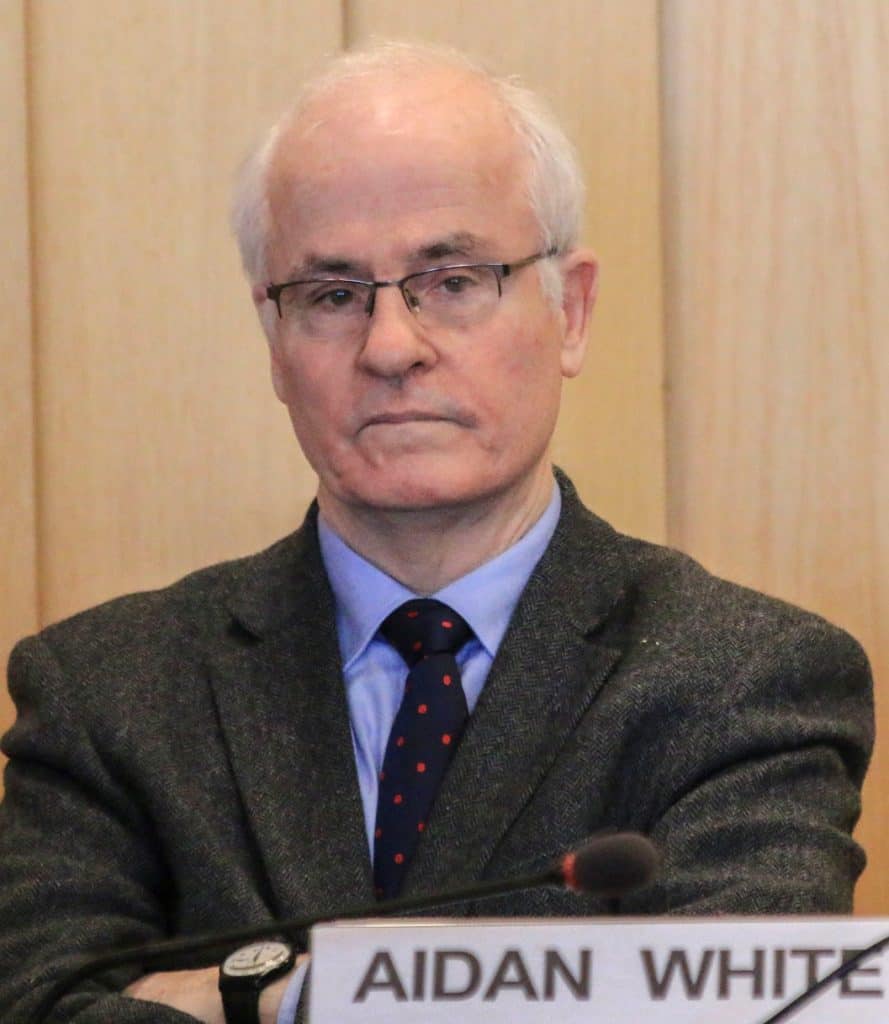 Aidan White is the founder of the Ethical Journalism Network, a global campaign promoting self-regulation, good governance and ethical conduct in the media. In this interview, EJO fellow Asma Abidi asked White to elaborate on the ethical aspects of reporting on the Covid-19 pandemic.
Aidan White is the founder of the Ethical Journalism Network, a global campaign promoting self-regulation, good governance and ethical conduct in the media. In this interview, EJO fellow Asma Abidi asked White to elaborate on the ethical aspects of reporting on the Covid-19 pandemic.
Q: What impact has the Coronavirus crisis had on journalism?
A: Actually, coronavirus is the story that has brought people back to journalism. I mean, it’s the story that made them realise to what extent reliable and accurate information is an essential part of their existence. The current user/reader/viewer’s interest in traditional media is very high. All the traditional media are spiking in terms of public use and the reason for that is the need to get accurate information about the pandemic. People are not turning to Twitter, to Facebook or to chat rooms, they are actually going back to traditional journalism. In moments of crisis, whether political crisis, a conflict or a humanitarian crisis like what are we experiencing now, people need access to reliable sources of information.
Q: Have you produced guidelines for journalists covering the pandemic?
A: In terms of the guidelines, I think journalists have to do what they’ve always done and that is to produce information that’s accurate, fact-based, independent, unbiased and impartial and above all, information which is showing humanity, which takes account of people who are most vulnerable, the people who need to know the most, the people of our communities who need to be protected. Those are among the core values of journalism which are very important now. The central message is that journalists have to show more care, more sensitivity, and more attachment to the core values when reporting the health emergencies. I think we are already seeing that more and more.
Q: In the past, coverage of the Ebola crisis in Africa was criticised for not treating vulnerable people with enough respect. Which ethical considerations should journalists bear in mind when reporting on the Coronavirus pandemic?
A: There are differences between covering the Ebola emergency in Africa and the current Coronavirus outbreak. One is proximity. Coronavirus is not a disease or a health emergency in a far-off place, it is not in Africa, it is not spreading within very poor populations or poverty-stricken communities of the world, Coronavirus is at home. It is something that affects you and your neighbours. As a result of that, media are showing a greater respect for their audiences than they did when reporting the Ebola crisis. During that crisis, there was a lack of sensitivity and more sensationalism in the way journalists reported.
Journalists are showing greater respect than they showed when reporting on the Ebola crisis.
Today journalists are reporting from their own backyards, about their own neighbours and their own communities. Here, in Western European countries in particular, journalists are showing greater respect than they showed when reporting on the Ebola crisis. I would hope that they are learning a lesson. When reporting a humanitarian health emergency, whether it’s at home or abroad, all journalists should strictly apply journalism core values and should show care and sensitivity in their work. There has been less sensationalism in reporting the Covid-19 pandemic, although some media have contributed to a mood of panic within certain communities.
There are some facts that need to be addressed and recognised but this doesn’t mean to create shock and panic within the community. Far from it: the more useful information we give to the community, the better they protect themselves in the future.
Q: Do you have any top tips for journalists who want to make sure they report responsibly and ethically on the current health emergency?
A: Remember the principles of journalism: be accurate and fact-based in your reporting, do not report rumours or speculation. You should only report facts that can be corroborated. Also, you have to show humanity. The ethics of humanity are critical in journalism.
Journalists have to remember we are dealing with people.
Showing respect means being careful with pictures of people who are suffering. Ask yourself if this image is relevant. Make sure you have asked the subject of the photo for permission to use it. Check if the picture really contributes to the story or if it creates uncertainty and unease. Sensitivity is essential in selecting the language and the pictures you use.
Journalists have to remember we are dealing with people, so this a human story above all. Bear in mind that vulnerable groups and people at risk should be shown compassion. Make sure that their story is being told. Remember that there are many groups of people such as migrants and minorities who need to be considered at this particular time. Journalists need to look out for those people who might get forgotten in this whole pandemic discussion.
I have to say, on the whole this have been a good and important period for journalism. We have seen quality reporting almost everywhere. We have also seen the return of public-interest journalism to the headlines. This opens the door to more serious considerations: to protect journalism and support public interest journalism in the future.
Opinions expressed on this website are those of the authors alone and do not necessarily reflect or represent the views, policies or positions of the EJO.
If you liked this story, you may also be interested in “Covering a pandemic: the challenge for journalists“
See “How media worldwide are covering the coronavirus crisis” for a complete list of EJO articles in English devoted to this topic.
Photo of Aidan White: UNESCO Communication and Information Flickr account (Creative Commons)
Tags: coronavirus, Covid-19, Disaster Reporting, Ethical Journalism Network, Photojournalism, public interest journalism, Trust in Media













































